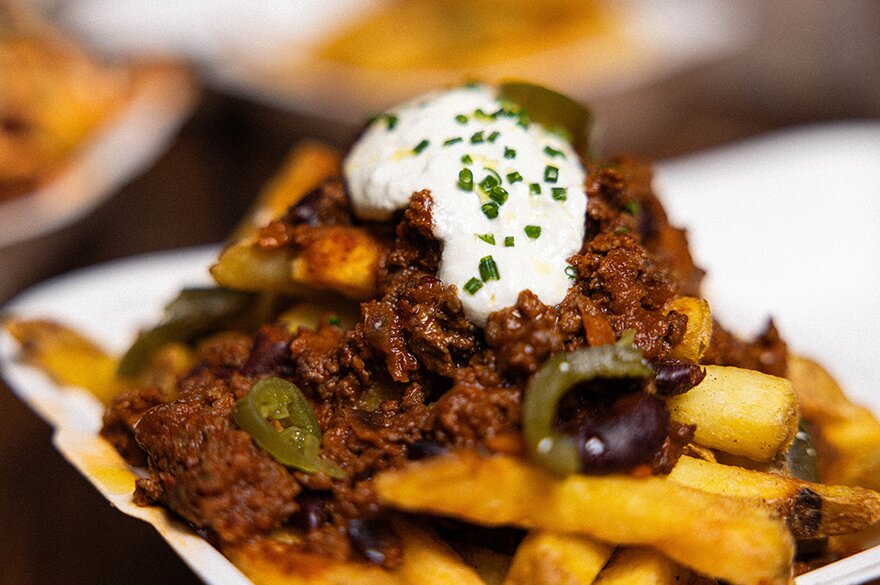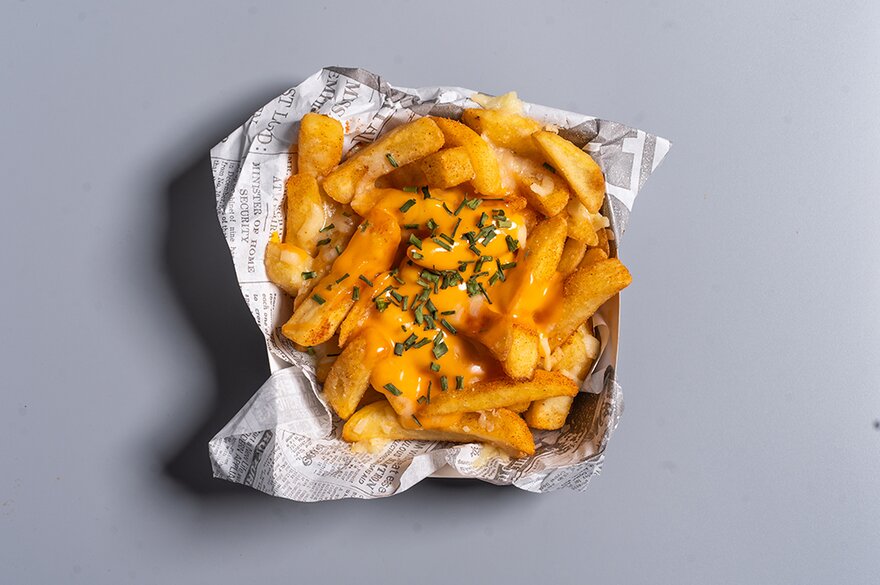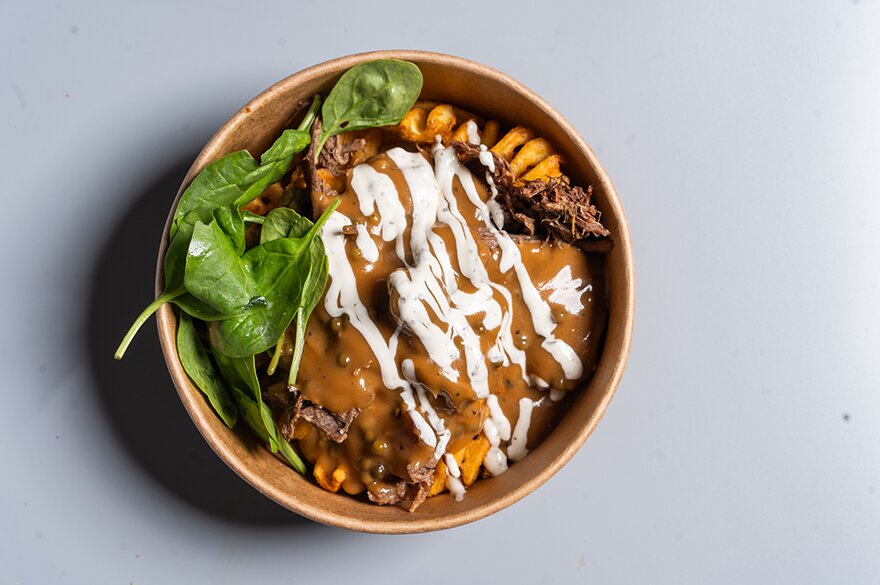Once the home of tepid pies and Bovril, football food has undergone a revolution. Here's how caterers have redefined the match-day experience
Last year saw a World Cup final for the ages; two juggernauts duking it out at the end of an epic 32-team contest that saw shocks, upsets and lots and lots of pulled pork as well as a fair bit of katsu chicken. We are, of course, talking about the Footy Scran World Cup – a series of online polls run by Twitter account Footy Scran that pitted stadium dishes against each other in a knock-out competition, culminating in LA Galaxy's Korean fried chicken beating Oxford City's loaded fries by 51% to 49%.
Across three days, a whopping 435,000 votes were cast. Because, if you hadn't noticed already, football fans take stadium food very seriously these days.
"People's attitude to sporting events has changed," says Andrew Taylor, catering services director at Tottenham Hotspur Football Club. "When we go out we want an experience, we want the Instagram moment, we want something that we can talk about. And that's reflected in people's approach to sports."
Of course, football stadium food wasn't always beef brisket and goat curry. Henry Crane, deputy general manager at Tiger Events, the in-house catering company that looks after Hull City Football Club's MKM stadium, remembers vividly what it was like when he started.
"When I took over in 2013, the offering was as you would expect and pretty much like every other stadium out there: pies, hotdogs, burgers – that was basically everything we did. And we weren't even particularly fantastic at that."
One of the excuses given for why food at football stadiums was so universally bad was the sheer quantity of fans caterers need to feed in an incredibly short period of time.
"We trade for an hour before the game and half an hour at half-time and that's it," says Crane. "With football and rugby, for us, it's basically just 60 hours a year. It's a really difficult environment. You're trying to serve so many people within the constraints you have, and you're only as good as your least-trained, least-experienced member of staff."
However, over the past five years, forward-thinking caterers have managed to work within those limitations. In 2019, Tottenham Hotspur opened its new stadium and put F&B at the heart of its offering. Run as a joint venture between the club and contract caterer Levy, there are 80 catering outlets with 500 serving points for general admission tickets, plus an additional 13 restaurants for premium guests who benefit from inclusive food.
Taylor sees it as a high-water mark in a trend that has been growing slowly over the last 15 years. "Look back over the last few years, at how new stadiums tried to position themselves as the newest, the biggest, the best. It started with the Emirates Stadium [in London] where the facilities were very different, and prior to that it was Wembley. Tottenham's stadium has been able to position itself as different from those to develop a best-in-class fan experience."
Hospitality packages in the Premier League
While the 2010s saw hospitality packages improve in Premier League lounges, it has only been since Covid that the foodie revolution has really hit the terraces. At Ashton Gate Stadium, home to football team Bristol City and rugby union team Bristol Bears, concessions manager Dave Gorwill has overseen a premiumisation of the offering, with his work recognised with two years in the top three of the Best Retail Catering Award at the Stadium Events & Hospitality Awards – an award that Crane and Tiger Events won this year with Tottenham coming second.
"When I started, the food offering was quite basic," says Gorwill. "We were serving dishes that were labour intensive. But we are very lucky here in that we run the catering in-house, so we can make decisions quickly and react quickly. We started introducing premium pies from a local company – venison, or beef and oyster, or pumpkin at Halloween – and the uptake was great, which showed us that the fans want good food."
At the MKM, Crane didn't have the luxury of a new stadium, but he was able to retrofit the catering outlets. "Just before Covid I made a business case to install fryers. We started doing chips and from there we said: ‘OK, what else can we do?' We bought in a great pulled pork product and sold loaded fries. But Covid disrupted all the supply chains and the product disappeared. The replacement was twice the price and half as good. We started to make it ourselves and quickly realised we've got a far better and cheaper product. So we thought: what else can we put it on? We started selling pulled pork buns and loaded hotdogs and the offering expanded from there.
"Every time we've challenged the fans a little bit – whether it's a Korean pork dish or katsu curry or teriyaki chicken – they've responded in big numbers to show that there's a real appetite out there for this stuff."
Grab and go is essential in sports crowd catering
Gorwill also extended his offering into the likes of premium hotdogs with pulled pork, jerk goat curry and vegan mezze boxes – all cooked in-house. Where deliciousness meets speed of serve is where the best stadium food is found, he says. "Everything has to be grab-and-go. We have to be able to serve it quickly. In 2017 we were taking 60.9 seconds to serve a customer. Now, we have that down to 34.7."
"It's all very well doing beautiful food, but if you can only do three portions at half-time you've got a real problem," says Crane. "We exhaustively practice and test the dishes. There's been a huge drive in recruitment and training, training, training. What's the portion size? What spoons do we use to serve this? What are the ergonomics of the kiosk that means we can get this out in this time?"
For Crane, the initial uptake of the loaded fries and pulled pork buns was strong. But it needed the intervention of another post-Covid phenomenon to really launch it into the stratosphere. "We lucked out when Footy Scran picked up a few dishes on its Twitter feed and after that it went absolutely bananas. We went from doing six or seven kilos of this stuff a match to 20, 40, 60, up to 100 kilos a match."
Footy Scran Twitter account for foodie chat
Footy Scran, a Twitter account launched in November 2021 as lockdown eased and fans returned to stadiums, is a recurring theme when you discuss football food. Over the past 20 months, the account has amassed over half a million followers with its weekly posts of stadium dishes from the UK and abroad.
The good, the bad and the ugly are all featured, alongside a poll that asks a simple question: Scran or No Scran? Or in lay terms: good food or bad food? With hundreds of thousands of views per Tweet, there's a case to be put that it is now arguably the biggest influence on football stadium food.
"Footy Scran has been a brilliant, brilliant thing for our industry," says Crane. "Before, food just wasn't on most clubs' radar. They are in the business of selling tickets and raising commercial revenue, and the pie and Bovril on the concourse just didn't even enter into their consciousness. But now, when faced with millions of views every week – especially if it looks bad – it forces the club to take more interest in what they are doing."
Footy Scran hasn't just celebrated the best and named and shamed the worse – its effect is such that it has become an important part of some clubs' business models, especially lower down in the football pyramid. At Avro FC, an Oldham-based club in the seventh tier of English football, positioning itself as a foodie destination has been vital to its continued growth.
Shortly after lockdown, the club launched its own street food truck to cater for fans and players, offering the likes of an ultimate burger and chips (£7.50) and chimichurri steak and chips (£6.50), both of which have gone viral on Footy Scran.
"At this level, a lot of people will go groundhopping – they'll travel around watching non-league football. They're trying to make choices of which games to go to, so Arvo being well known on the circuit for good food certainly helps. It doesn't make us millions, but it certainly helps."
Crane notes that spend per head has increased by a third since they launched their street food dishes. While Gorwill has seen uptake of food increase to 35% of fans, up 10% from the previous year. All of this, of course, means extra revenue. But in a sport awash with money, Gorwill, Crane and Taylor all insist that this isn't the motivation. "The big factor for me working in this job and as a football fan is the supporter experience," says Gorwill. "Are the fans having the best experience they can?"
Football is about the whole matchday experience
Whereas once upon a time, a visit to a football stadium was purely about the sport – with a couple of beers thrown in – now clubs are looking at the whole matchday package in order to attract fans. When London-based club AFC Wimbledon opened its new Plough Lane stadium in 2021, revenue and operations manager Bal Srai identified food as an important factor in attracting locals into a club that had been in exile – first in Crystal Palace then in Kingston – for 30 years.
"In London, other clubs are doing well and in the Premier League and tickets might not be available, so we have a chance to be lots of fans' second team. If we can make the whole matchday experience as good as possible, there's more chance they will come back – even if the result wasn't great – and bring other fans with them."
With Elior signed up to do the stadium's catering, the club took the decision to vary the offering by negotiating to allow independent caterers to trade in the club's south stand. Now, at every game, up to half a dozen street food traders operate at the back of the stand. The club also partnered with Wimbledon-based craft brewer By the Horns to open a pub on the premises, even brewing its own craft ale, Crazy Gang, named after the club's infamous team of the 1980s. The club charge the street food vendors a flat fee to trade there, and while it might not be as financially lucrative as food sold through its in-house catering outlets, the benefit comes elsewhere.
"Ultimately it's a better offering for the fans. There's a lot of competition out there in Earlsfield and Wimbledon, so you really need to make them want to come to the stadium rather than eat elsewhere. We want the whole day to be a great experience. And if they stay longer and spend more as a result, that's a bonus."
Gorwill sees it as investing in the "football fan of the future". "We need these people to keep coming back and to invest in the club in the long-term. And food is such a great way of getting people in and getting them committed – especially kids. My daughter had a hot dog on her first match and now that hot dog is a big part of every match. People should be waking up on match day and thinking: ‘Right, what am I going to eat?' And we want them coming to the stadium, not going to McDonald's. Now it's a whole day event, not just a match. Football is becoming more like 20-20 cricket like that."
While football clubs are certainly revolutionising the match-day experience, all of this is just an extension of changing consumer habits, says Taylor. "If you look at the high street, it has changed markedly in the past three or five years. The experiential spend – whether it is axe-throwing or junkyard golf – has increased massively and that's had a huge effect on fans' expectations. We no longer go somewhere just to eat or just to watch a game – we're looking for more experience for our money."
The revolution is also just beginning. The likes of Tottenham are always looking at refreshing its offering. "We do members' events every month. We're constantly talking to them about where they go and whether or where they socialise," says Taylor.
While other Premier League clubs who have been at the sharp end of the ‘No Scran' vote are looking to play catch up. For the likes of Crane, however, this is a revolution that is long overdue. "I've always thought that this is a captive audience. Yes, we want to kind of maximise the return on that, but we want to do that by serving you the very best food that we can. Fans are much more astute about what good food is now than what people might assume."
The Footy Scran World Cup
June 2022 saw Twitter account Footy Scran pit 32 stadium dishes against each other over a three-day series of online polls. After 435,000 votes and a series of tight quarter and semi-finals – and an even closer final – LA Galaxy's Korean fried chicken beat Oxford City's katsu chicken fries in the final to win the Footy Scran World Cup. Below is the full list of dishes.
Group one
1 Parmo in a bun – Middlesbrough
2 Shrimp sandwich and fries – DC United
3 Wigan kebab – Rochdale AFC
4 Octopus filled balls – Kyoto Sanga FC
Group two
1 Beef brisket roll – Tottenham
2 Coxinha – Athletico Paranaense
3 Pork, stuffing, chips and gravy in a cob – Birmingham City
4 Pretzel – Bayern Munich
Group three
1 Double cheeseburger and cheesy chips – Airbus UK
2 Chicken tenders and waffle fries – Melbourne City
3 Breakfast wrap – Redditch Borough
4 Ice-cream nachos – Chicago Fire
Group four
1 Pulled pork loaded chips – Hull City
2 Chinese box – Reading City
3 Burritos – San Diego Loyal
4 Keilbasa – Hutnik Krakow
Group five
1 Korean fried chicken – LA Galaxy
2 Double bacon cheeseburger and chips – Horsham FC
3 Chicken and halloumi souvlaki – Dulwich Hamlet
4 Currywurst – Hertha Berlin
Group six
1 Chicken flatbread – Barnsley
2 Salt and pepper steak – Avro FC
3 Tacos and burritos with fries – FC Montreal
4 Pizza – Lazio
Group seven
1 Katsu chicken loaded fries – Oxford City FC
2 Tropeiro – Cruzeiro
3 Sausage, chips and curry sauce in a cob – Merthyr Town
4 Lemon tart – Lyon
Group eight
1 Steak and black pudding pie – Arbroath
2 Chicken katsu curry – FC Tokyo
3 Chicken tikka and chips – Aston Villa
4 Curry goat and naan – Bristol City
Continue reading
You need to be a premium member to view this. Subscribe from just 99p per week.
Already subscribed? Log In








